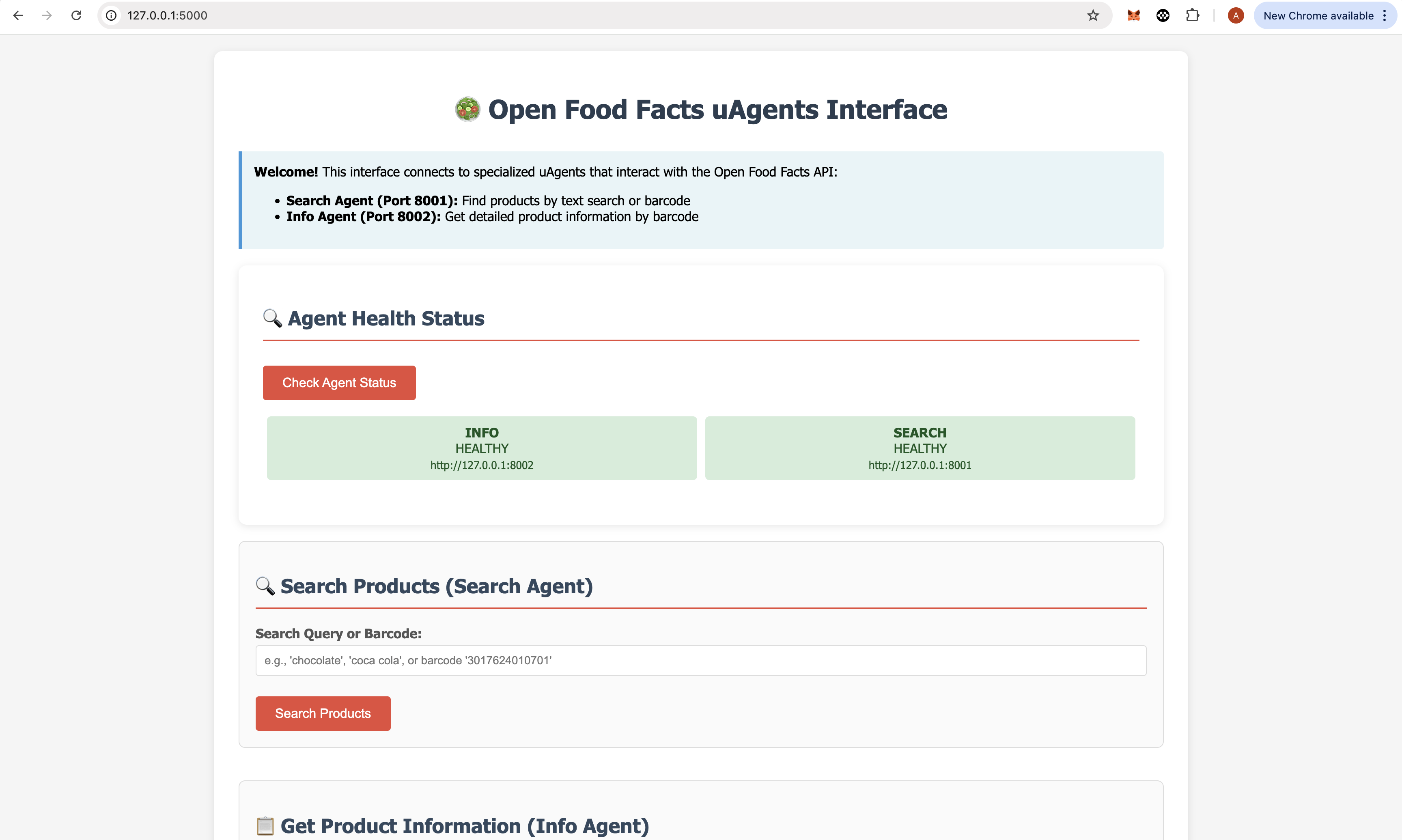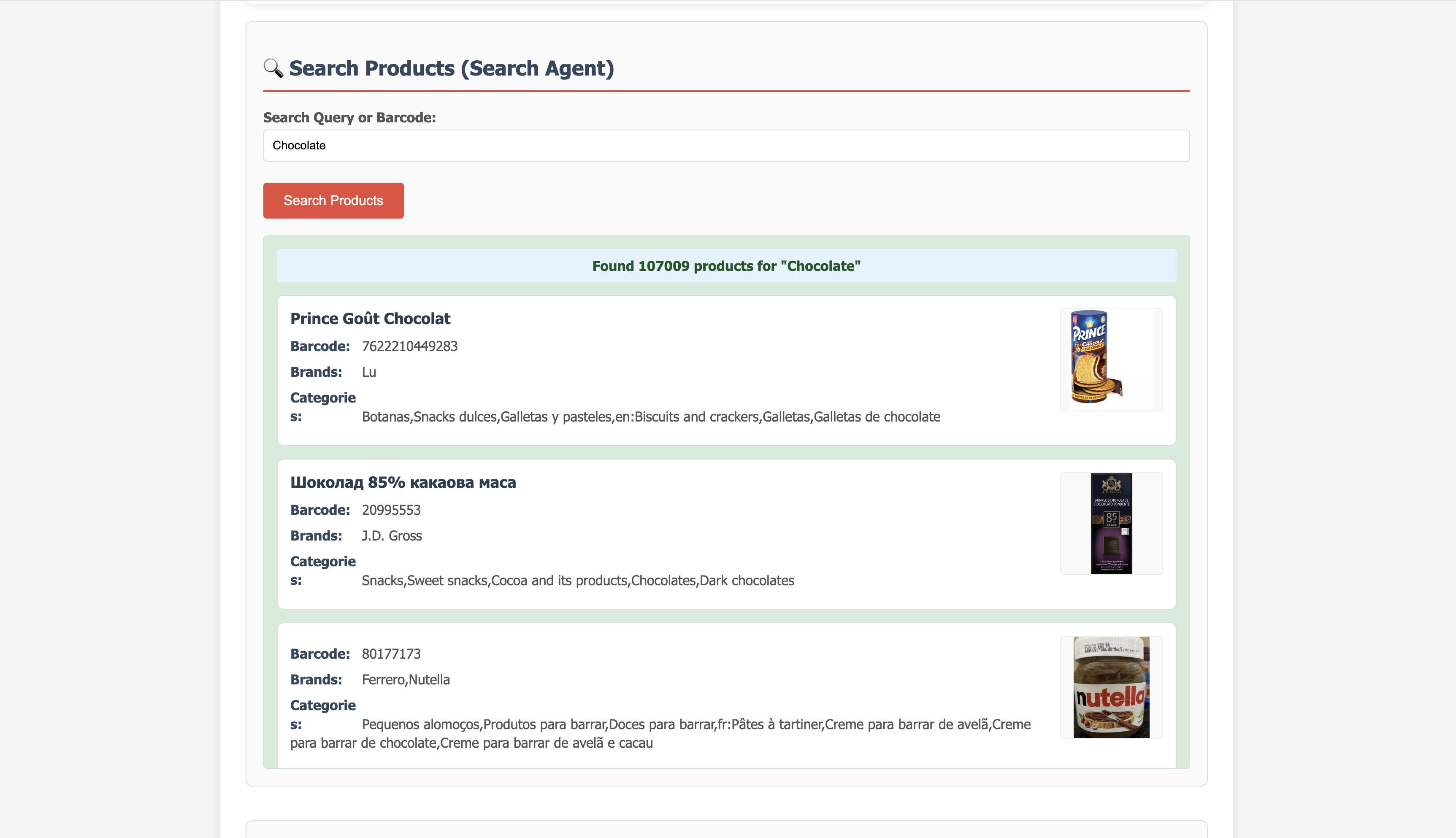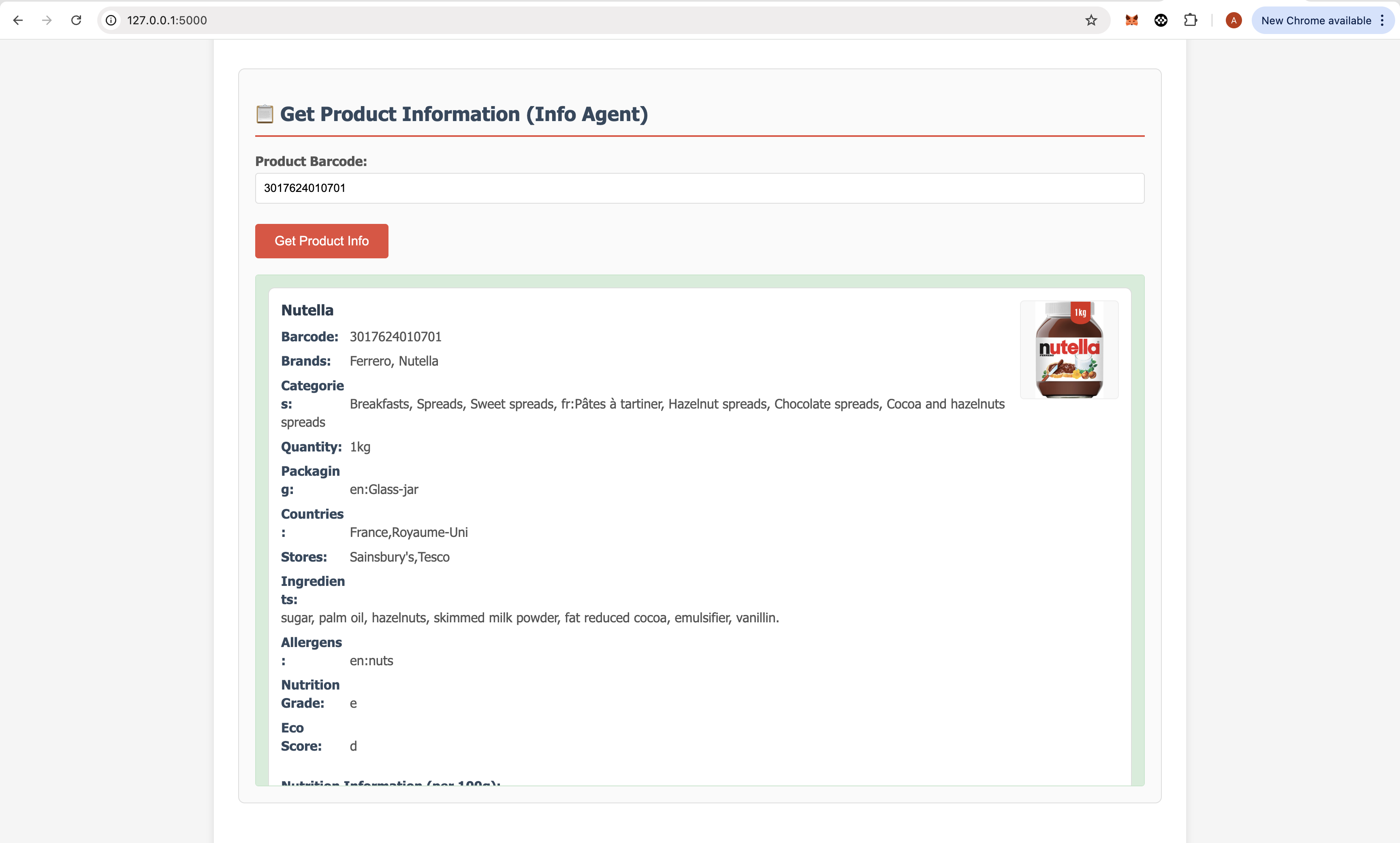Build a Frontend Web Application with uAgents and Open Food Facts API
This guide demonstrates how to create a complete web application that integrates uAgents with external APIs using a Flask frontend. We'll build a food product discovery system using the Open Food Facts API.
Overview
The Frontend Integration example provides:
- Two Specialized uAgents - Search Agent and Info Agent
- REST API Endpoints using uAgents framework
- External API Integration with Open Food Facts
- Modern Web Interface built with Flask and HTML/CSS/JavaScript
- Real-time Health Monitoring of all services
Prerequisites
Before you begin, ensure you have:
- Python 3.11+ installed
- Basic knowledge of Flask and web development
- Understanding of REST APIs and HTTP requests
Installation
1. Clone the Complete Example
git clone https://github.com/fetchai/innovation-lab-examples.git
cd innovation-lab-examples/frontend-integration
2. Set Up Virtual Environment
# Create virtual environment
python3 -m venv venv
# Activate virtual environment
# On macOS/Linux:
source venv/bin/activate
# On Windows:
# venv\Scripts\activate
3. Install Dependencies
pip install -r requirements.txt
Architecture Overview
Two Specialized uAgents
Our system consists of two specialized microservices:
- Search Agent (Port 8001): Handles product search queries
- Info Agent (Port 8002): Retrieves detailed product information
Frontend Application
- Flask Web App (Port 5000): Modern web interface to interact with agents
Quick Start
1. Start Search Agent
Terminal 1:
source venv/bin/activate # Activate venv if not already active
python3 product_search_agent.py
2. Start Info Agent
Terminal 2:
source venv/bin/activate # Activate venv if not already active
python3 product_info_agent.py
3. Start Frontend
Terminal 3:
source venv/bin/activate # Activate venv if not already active
python3 frontend_app.py
4. Access the Web Interface
Open your browser to: http://127.0.0.1:5000

Agent Implementation Details
Search Agent (Port 8001)
The search agent handles product discovery using natural language queries:
from uagents import Agent, Context, Model
import openfoodfacts
class SearchRequest(Model):
query: str
class ProductInfo(Model):
code: str
product_name: str
brands: str
categories: str
image_url: str
class SearchResponse(Model):
query: str
count: int
products: List[ProductInfo]
error: Optional[str] = None
search_agent = Agent(
name="product_search_agent",
port=8001,
endpoint=["http://127.0.0.1:8001/submit"],
)
@search_agent.on_rest_post("/search", SearchRequest, SearchResponse)
async def search_products(ctx: Context, req: SearchRequest) -> SearchResponse:
try:
query = req.query
ctx.logger.info(f"Searching for products with query: {query}")
# Search products using Open Food Facts API
results = api.product.text_search(query, page_size=10)
# Extract relevant information
products = []
for product in results.get("products", [])[:10]:
product_info = ProductInfo(
code=product.get("code", "N/A"),
product_name=product.get("product_name", "N/A"),
brands=product.get("brands", "N/A"),
categories=product.get("categories", "N/A"),
image_url=product.get("image_url", "")
)
products.append(product_info)
return SearchResponse(
query=query,
count=results.get("count", 0),
products=products
)
except Exception as e:
return SearchResponse(
query=req.query,
count=0,
products=[],
error=f"Failed to search products: {str(e)}"
)
Info Agent (Port 8002)
The info agent provides detailed product information using exact barcodes:
from uagents import Agent, Context, Model
import requests
class ProductRequest(Model):
barcode: str
class ProductInfoResponse(Model):
barcode: str
product_name: str
brands: str
categories: str
ingredients_text: str
allergens: str
nutrition_grades: str
ecoscore_grade: str
image_url: str
countries: str
stores: str
packaging: str
quantity: str
energy_100g: str
fat_100g: str
sugars_100g: str
salt_100g: str
error: Optional[str] = None
info_agent = Agent(
name="product_info_agent",
port=8002,
endpoint=["http://127.0.0.1:8002/submit"],
)
@info_agent.on_rest_post("/product", ProductRequest, ProductInfoResponse)
async def get_product_info(ctx: Context, req: ProductRequest) -> ProductInfoResponse:
try:
barcode = req.barcode
ctx.logger.info(f"Getting product info for barcode: {barcode}")
# Use direct API call to Open Food Facts
url = f"https://world.openfoodfacts.org/api/v0/product/{barcode}.json"
headers = {
'User-Agent': 'uAgents-FoodInfo/1.0 (https://github.com/fetchai/uAgents)'
}
response = requests.get(url, headers=headers, timeout=10)
data = response.json()
if data.get('status') != 1 or "product" not in data:
return ProductInfoResponse(
barcode=barcode,
# ... other fields with "N/A"
error="Product not found"
)
product = data["product"]
# Extract comprehensive product information
return ProductInfoResponse(
barcode=barcode,
product_name=product.get("product_name", "N/A"),
brands=product.get("brands", "N/A"),
categories=product.get("categories", "N/A"),
ingredients_text=product.get("ingredients_text", "N/A"),
allergens=product.get("allergens", "N/A"),
nutrition_grades=product.get("nutrition_grades", "N/A"),
ecoscore_grade=product.get("ecoscore_grade", "N/A"),
image_url=product.get("image_url", ""),
countries=product.get("countries", "N/A"),
stores=product.get("stores", "N/A"),
packaging=product.get("packaging", "N/A"),
quantity=product.get("quantity", "N/A"),
energy_100g=str(product.get("nutriments", {}).get("energy_100g", "N/A")),
fat_100g=str(product.get("nutriments", {}).get("fat_100g", "N/A")),
sugars_100g=str(product.get("nutriments", {}).get("sugars_100g", "N/A")),
salt_100g=str(product.get("nutriments", {}).get("salt_100g", "N/A"))
)
except Exception as e:
return ProductInfoResponse(
barcode=req.barcode,
# ... other fields with "N/A"
error=f"Failed to get product info: {str(e)}"
)
Frontend Implementation
Flask Backend
The Flask application serves as a bridge between the web interface and uAgents:
from flask import Flask, render_template, request, jsonify
import requests
app = Flask(__name__)
# Agent endpoints
AGENTS = {
"search": "http://127.0.0.1:8001",
"info": "http://127.0.0.1:8002"
}
@app.route('/search_products', methods=['POST'])
def search_products():
"""Search products via search agent"""
try:
query = request.form.get('query', '').strip()
if not query:
return jsonify({"error": "Please provide a search query"})
# Call search agent with POST request
payload = {"query": query}
response = requests.post(f"{AGENTS['search']}/search", json=payload)
response.raise_for_status()
result = response.json()
# Format the results for display
formatted_results = []
if result.get('products'):
for product in result['products'][:10]:
formatted_product = {
'name': product.get('product_name', 'N/A'),
'brands': product.get('brands', 'N/A'),
'barcode': product.get('code', 'N/A'),
'categories': product.get('categories', 'N/A'),
'image_url': product.get('image_url', '')
}
formatted_results.append(formatted_product)
return jsonify({
"success": True,
"count": result.get('count', 0),
"query": query,
"products": formatted_results
})
except requests.RequestException as e:
return jsonify({"error": f"Failed to connect to search agent: {str(e)}"})
except Exception as e:
return jsonify({"error": f"Search failed: {str(e)}"})
@app.route('/health')
def health_check():
"""Check health of all agents"""
health_status = {}
for agent_name, agent_url in AGENTS.items():
try:
response = requests.get(f"{agent_url}/health", timeout=5)
if response.status_code == 200:
health_data = response.json()
health_status[agent_name] = {
"status": "healthy",
"url": agent_url,
"agent_info": health_data
}
else:
health_status[agent_name] = {"status": "unhealthy", "url": agent_url}
except:
health_status[agent_name] = {"status": "offline", "url": agent_url}
return jsonify(health_status)
Testing the Application
1. Product Search Testing
Search Query: "chocolate"
- Navigate to http://127.0.0.1:5000
- In the "Search Products" section, enter
chocolatein the search field - Click "Search Products" to see results

The search will return multiple chocolate products with product names, brands, categories, barcodes, and images.
2. Product Details Testing
Barcode Query: "3017624010701"
- In the "Get Product Information" section, enter the barcode
3017624010701 - Click "Get Product Info" to retrieve detailed information

This will display comprehensive information for Nutella including basic information, ingredients, nutrition facts, and quality scores.
3. Health Status Monitoring
Click the "Check Agent Status" button to verify all services are running:

This displays the real-time status of both Search Agent (Port 8001) and Info Agent (Port 8002).
Key Features Demonstrated
1. Microservice Architecture
- Separation of Concerns: Each agent has a specific responsibility
- Independent Scaling: Agents can be scaled independently
- Fault Isolation: Failure in one service doesn't affect others
2. REST API Design
- Proper HTTP Methods: POST for data operations, GET for health checks
- Pydantic Models: Type-safe request/response validation
- Error Handling: Comprehensive error responses
3. Frontend Integration
- Ajax Requests: Asynchronous communication with agents
- Real-time Updates: Dynamic UI updates without page refresh
- Health Monitoring: Live status checking of backend services
4. External API Integration
- HTTP Client Usage: Direct API calls to Open Food Facts
- Data Transformation: Converting external API responses to internal models
- Error Handling: Graceful handling of external API failures
GitHub Repository
For the complete code and additional examples, visit the Frontend Integration Example repository.
This repository includes:
- ✅ Complete agent implementations
- ✅ Flask web application
- ✅ Modern responsive web interface
- ✅ Docker configuration
- ✅ Comprehensive documentation
- ✅ Testing examples